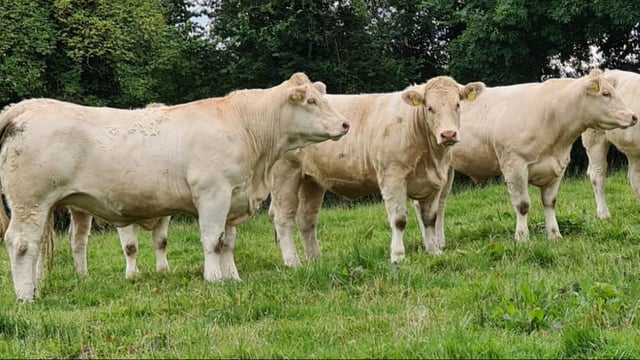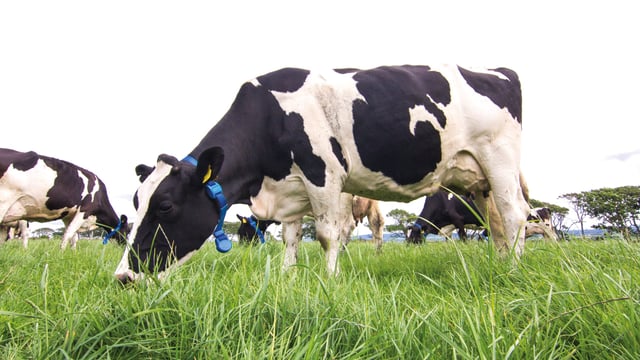Limerick farmer strives for better nitrogen efficiency
Limerick dairy farmer, John MacNamara spoke about how he farms with a strong approach to farming for better nitrogen (N) efficiency at the Teagasc National Dairy Conference.
John and Olivia MacNamara who farm in Knockainey, Co. Limerick, were the overall winners of the 2023 National Dairy Council (NDC) & Kerrygold Quality Milk Awards.
The theme of the conference was 'Robust Dairy Farming for Future Challenges'.
MacNamara said that beyond farming, "it's so important to be involved in something outside of farming, and I'm heavily involved with the ladies football team".
The MacNamaras are milking 220 spring calving cows on a 78ha milking platform with another 38ha on the outside farm which is 6 miles from home, making the total farm area 116ha.
The MacNamaras run a high economic breeding index (EBI), crossbred herd with calving commencing on the first week of February.
The herd has an EBI of €239 with a calving interval of 371 days, a replacement rate of 19% and six-week calving rate of 75% recorded in 2023.
The MacNamaras aim to “run an enjoyable, profitable, efficient, sustainable dairy business, while also enjoying good family work life balance”.
The farm grows 14+ t/ha of grass which is achieved through good grassland management, consistent reseeding and over-sowing with clover incorporation becoming more important year-on-year.
At the conference, MacNamara set out a list of approaches the farm has taken in the last number of years, as follows:
- Grow grass with clover;
- Better control of nutrient applications;
- Gets a prediction of farm dry matter (DM) production and grass growth weekly;
- Improving nature areas of the farm;
- Improving carbon farm footprint;
- Water quality awareness;
- Making life easier with underpass, bridge and contractor usage.
MacNamara also sets out a list of key performance indicators that he feel he needs to set targets for to keep production and performance at a high.
The targeted pasture production for the farm is to grow 15t DM/ha, feeding less than 700kg of concentrates per cow with a farm stocking rate of 2.9 cows/ha on the milking platform.
MacNamara targets spreading 180kg of chemical N/ha, while aiming to achieve 480kg of milk solids/cow, with a milk protein of 3.90%.

MacNamara aims for his herd's EBI to be over €250 with a six-week calving rate of 85%, and to have 15% of the farm area under habitat.
MacNamara told attendees that nutrient management is crucial on the farm, as he follows his soil sampling and targets low areas.
"At the end of the day, you have to make sure we are still growing the grass and use the growth prediction to make decisions on the farm," he said.
The Limerick farmer added that "above all else, financial performance has to be maintained, as it drives everything else and we need to focus on getting our milk quality bonuses and maximising output".
When it comes to early spring application, MacNamara will only spread chemical N in the right conditions when the soil temperature and moisture is right and tries to get out 30kg N/ha in February.
"Slurry is crucial in early spring" according to MacNamara, as he will spread 2,500gal/ac to one-third of the farm in early spring and he said they have adequate storage on the farm which allows for spreading in favourable conditions.
The cows are out grazing in February and depending on ground conditions, MacNamara will implement on/off grazing and feed high quality silage.
In the summer months, it's about matching the stocking rate to the herd's feed demand for MacNamara and he does this through targeting paddocks with slurry or lime that are low on phosphorus (P) and potassium (K).
MacNamara will reduce the amount of N being spread on clover paddocks by about 25% and feed a low protein supplement of less than 13% in the summer months.
The aim at this stage of the year is to have the cows going into lush covers to push on the milk protein to the target of +3.8%.
In the autumn time, all slurry and soiled water is applied onto lower index fields in good growing conditions and to keep the yard clean to manage effluent and dirt around the farm.
MacNamara aims then to close off the farm with an adequate closing cover of at least 750kg DM/ha, while protecting the clover paddocks for the winter ahead.
MacNamara told attendees that "if you have pride in what you do, you'll always do it better".





